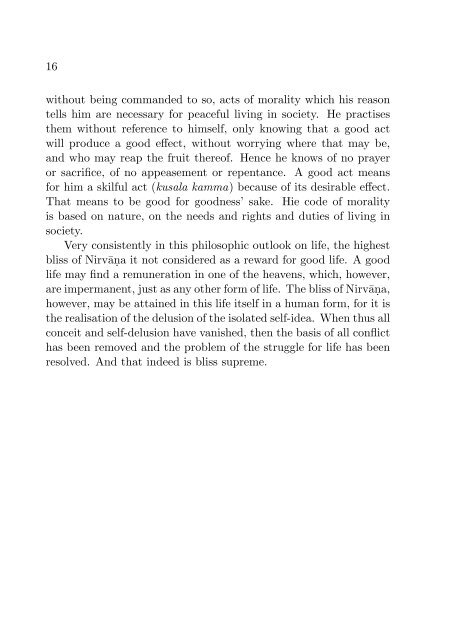Towards the Truth
Notes from a three-day debate in the 1940’s about Buddhism and Christianity.
Notes from a three-day debate in the 1940’s about Buddhism and Christianity.
Create successful ePaper yourself
Turn your PDF publications into a flip-book with our unique Google optimized e-Paper software.
16<br />
without being commanded to so, acts of morality which his reason<br />
tells him are necessary for peaceful living in society. He practises<br />
<strong>the</strong>m without reference to himself, only knowing that a good act<br />
will produce a good effect, without worrying where that may be,<br />
and who may reap <strong>the</strong> fruit <strong>the</strong>reof. Hence he knows of no prayer<br />
or sacrifice, of no appeasement or repentance. A good act means<br />
for him a skilful act (kusala kamma) because of its desirable effect.<br />
That means to be good for goodness’ sake. Hie code of morality<br />
is based on nature, on <strong>the</strong> needs and rights and duties of living in<br />
society.<br />
Very consistently in this philosophic outlook on life, <strong>the</strong> highest<br />
bliss of Nirvāṇa it not considered as a reward for good life. A good<br />
life may find a remuneration in one of <strong>the</strong> heavens, which, however,<br />
are impermanent, just as any o<strong>the</strong>r form of life. The bliss of Nirvāṇa,<br />
however, may be attained in this life itself in a human form, for it is<br />
<strong>the</strong> realisation of <strong>the</strong> delusion of <strong>the</strong> isolated self-idea. When thus all<br />
conceit and self-delusion have vanished, <strong>the</strong>n <strong>the</strong> basis of all conflict<br />
has been removed and <strong>the</strong> problem of <strong>the</strong> struggle for life has been<br />
resolved. And that indeed is bliss supreme.
















